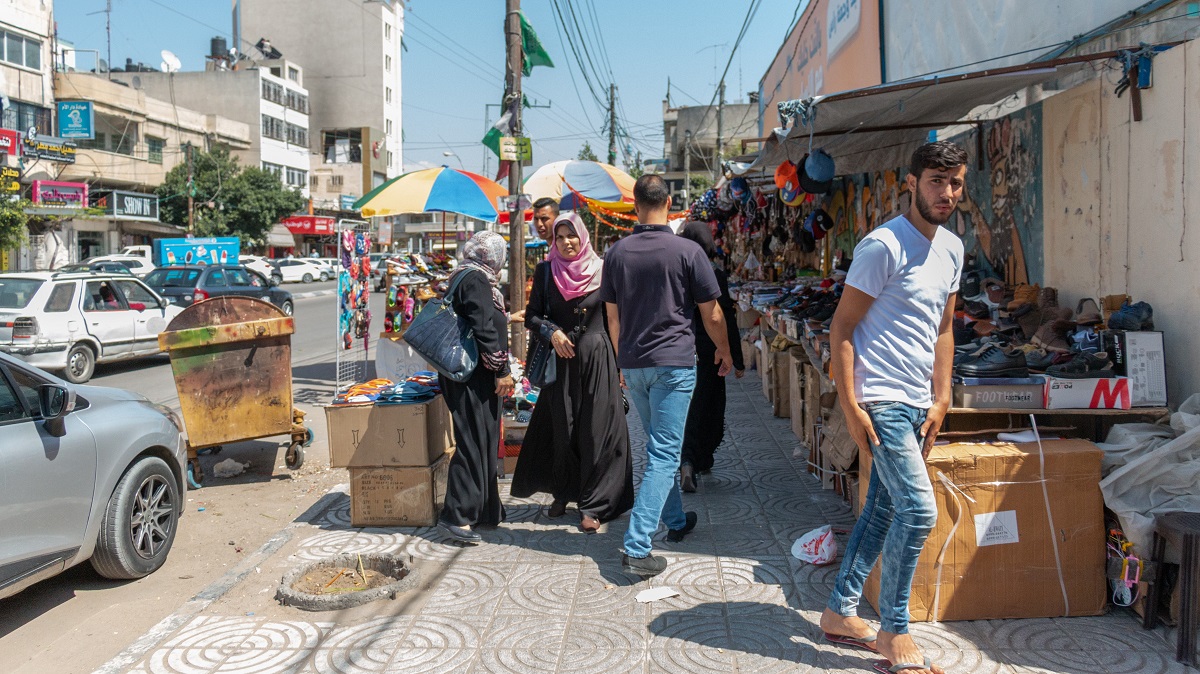#156 THE G|O BRIEFING, OCTOBER 26, 2023
From Humanitarian Geneva, Two Reports Illustrate the Palestinian People's Plight
Today in The Geneva Observer, our focus is on the Palestinian condition. We look at two documents written before the October 7 Hamas attack on Israel: a United Nations Conference on Trade and Development (UNCTAD) report, and a comprehensive survey of the UN Relief and Works Agency for Palestine refugees (UNRWA) from Geneva’s Graduate Institute (IHEID). The two papers provide much-needed economic, historical, and political context to the highly volatile, complex, and tragic events currently unfolding in the region.
Last Tuesday, in his speech before the UN Security Council, after he unequivocally and strongly condemned Hamas’ attacks on Israel, the UN Secretary-General Antonio Guterres reminded the Council and the international community that the conflict didn’t happen in “a vacuum.” “The Palestinian people have been subjected to 56 years of suffocating occupation,” he said, “they have seen their land steadily devoured by settlements and plagued by violence; their economy stifled; their people displaced and their homes demolished. Their hopes for a political solution to their plight have been vanishing.”
That is the story that these two documents tell.
Israel’s decades-long blockade of Gaza has hollowed out the economy of the tiny coastal enclave, leaving 80% of its population dependent on international aid, reveals the first document from UNCTAD. The report itself—available below—covers 2022, but was only published on Wednesday, with an accompanying communiqué updated to reference the current crisis.
Even before the war, the conditions in Gaza were already highly dire, the UN agency reports, with an economy still reeling from the shock of the COVID-19 pandemic. “Against a backdrop of heightened political tensions, deepening dependency on the occupying Power, and a stalled peace process, the Palestinian economy continued to operate below potential in 2022 as other persistent challenges intensified. These include the loss of land and natural resources to Israeli settlements, endemic poverty, a shrinking fiscal space, declining foreign aid, and the build-up of public and private aid.” Gaza’s 45% unemployment rate ranks among one of the highest in the world, UNCTAD says, and is much higher than the West Bank’s rate of 13%.
“Living in Gaza in 2022,” UNCTAD describes, “meant confinement in one of the most densely populated spaces in the world, without electricity half the time, and without adequate access to clean water or a proper sewage system. It meant a 65% probability of being poor, 41% probability of dropping out of the labour force in despair, and for those looking for work, a 45% probability of being unemployed.” Women and children are the hardest hit, the UN agency stresses.

The new conflict has brought yet more unspeakable suffering, death, and destruction. The October 7 attack by Hamas militants on Israel led to the killing of 1,400 people and the seizing of more than 220 hostages, according to the Israeli authorities, while Israel’s continued bombardment of Gaza has killed more than 6,500 people, including 2,704 children, 1,584 women, and 364 elderly persons, according to the Ministry of Health in Gaza.
Over the past week, UNRWA has urgently and repeatedly warned that it will have to cease or at least seriously recalibrate its aid operations in the Gaza Strip within the next few days if fuel is not delivered. Israel, meanwhile, continues to refuse the delivery of fuel, claiming it would benefit Hamas by powering its military machine.
On day 19 of the war, this is UNRWA’s latest situation report:

UNRWA Situation Report
Much broader in scope and more in-depth than the UNCTAD report, ‘UNRWA and the Palestine Refugees: Challenges for Developing a Strategic Vision’ is a comprehensive look at the UN’s main provider of aid to the Palestinians. Two years in the making, the document, from Geneva’s Graduate Institute, was written by an international team of Middle East experts.
“The Palestinian refugee question is a political issue, which requires a political solution, in line with international law,” the project’s authors write. “Approaching Palestinian refugees and UNRWA solely through humanitarian and human development frameworks—or only based on financial considerations, as has been done by the UN for the majority of its engagement with the issue—is both woefully immoral and fundamentally unjust.”
Could UNRWA Be the Palestinian People’s Best Long-Term Hope for Justice?
Well before the current crisis, the United Nations Relief and Works Agency for Palestine Refugees in the Near East (UNRWA) was already grappling with severe financial problems, operating on what many consider a mandate in need of major redefinition. The Agency was created by the UN General Assembly in the wake of the 1948 Arab-Israeli War to provide essential services for Palestinians who had been made refugees by the conflict. It is a decision that continues to have profound implications: Seven decades later, the UN and its Member States still bear responsibility for Palestinian refugees.
In 2021, convinced of the need to take a hard look at the Agency and its operations and to clarify its mission, UNRWA’s Commissioner-General Philippe Lazzarini commissioned a report. He reached out to Geneva’s Graduate Institute and to Riccardo Bocco, one of the world’s leading experts on the Palestinian issue. “We wanted to support a reflection among UN Member States, and with UNRWA and the UN, about UNRWA’s operations and operational context, and how we could improve and adapt to an evolving situation. It was important for us to ask credible external [academic] researchers to help us reflect and review how we work,” Tamira Alrifai, UNRWA’s communication director, told us.
Coordinated by Riccardo Bocco, Professor Emeritus of Political Sociology at the Graduate Institute, and Fritz Froehlich, a consultant to the Swiss Foreign Ministry, ‘UNRWA and the Palestine Refugees: Challenges for Developing a Strategic Vision’ was published in late 2022. The Swiss government financed the study.
“Since at least 2000, UNRWA has struggled in a vortex of crises to sustain human development and preserve socio-economic stability, as frustrated refugees await an ever-receding ‘just solution,’” its authors write, noting that “cascading challenges driven by political tensions, global economic declines, pandemics, and food insecurity threaten its ability to maintain service delivery at historic levels of quality and equity.” However, despite such enormous challenges, they point out that “UNRWA has been remarkably successful in providing education, health, and social welfare services” since its inception in 1949.
Before putting UNRWA itself under the microscope, the paper stresses the context in which the Agency has had to operate—and, for the researchers, the responsibility the international community bears for the lack of support it has received.
A Woefully Immoral and Unjust Situation
Contributors Francesca Albanese, now Special Rapporteur on the situation of human rights in the Palestinian Territory, and Ardi Imseis, Assistant Professor of Law at Queen’s University, focus on The UN’s legal and moral responsibility. Their academic assessment is worth quoting at some length:
“For most of the past seven decades, the international community has primarily concentrated its support to Palestinian refugees on sustaining the UN Relief and Works Agency for Palestine Refugees in the Near East (UNRWA) while, regrettably, disengaging with the underlying causes of the plight of the Palestinian refugees and related grievances. At this critical point in the life of UNRWA (largely owing to “donor fatigue”), the matter of the Palestinian refugees deserves to be lifted from the stagnation and dependence it has been condemned and forced into. It is time to step up efforts and reignite the discussion, taking full advantage of UNRWA’s unique and leading 73-year role in service of the Palestinian refugees.”
According to Albanese and Imseis, “Approaching Palestinian refugees and UNRWA solely through humanitarian and human development frameworks—or only based on financial considerations, as has been done by the UN for the majority of its engagement with the issue—is both woefully immoral and fundamentally unjust. It represents a betrayal of the UN’s permanent responsibility for the question of Palestine until it is resolved in all of its aspects in accordance with international law. The Palestinian refugee question is a political issue, which requires a political solution, in line with international law (i.e., humanitarian and development strategies, though important, are palliatives).”
Redressing Injustices
The Graduate Institute’s paper broadly argues that Palestinian refugees need to be defended by “an international entity engaged not only in supporting their humanitarian needs but also in upholding their human rights, including the right to return, restitution, and compensation, as well as facilitating such other durable solutions refugees may want to pursue. These rights,” argue the experts, who invoke international and humanitarian law, “flow from the illegality of the ethnic cleansing of Palestine and have only become stronger with the passage of time and the further advancement of international law.”
The researchers believe that implementing a profound redefinition of UNRWA’s mission—including turning its refugee registration system into “a central repository of documentary evidence of the refugees’ historic claims”—could eventually open the door to “a broader reconsideration of the Agency’s modus operandi, moving away from parallel delivery of some services in some of its ‘fields’ of operations.” They suggest, for instance, that “the development of a Comprehensive Refugee Framework for Palestinian Refugees (CRF-PR) could be explored as having the potential to reenergize the discourse in support of unmet Palestinian refugee rights.”
The Responsibilities of the UN and its Member States
The UN and its member states, the authors remind us, cannot escape their responsibility towards the Palestinian refugees and, ipso facto, regarding UNRWA. Again, we choose to quote Francesca Albanese and Ardi Imseis at length:
First: Palestinian refugees remain a permanent UN responsibility. If not for the UN decision to partition British Mandate Palestine in 1947, the Palestinian refugees would not be in the place they are today. The international community is legally, politically, and morally obligated to support UNRWA’s mandate so as to comprehensively respond to the needs and rights of the refugees based on international law and the unique permanent responsibility of the UN for the question of Palestine.
Second: UNRWA was established as part of a comprehensive UN framework to resolve the question of Palestine that included the UN Conciliation Commission for Palestine (UNCCP) and incorporated both protection and durable solution functions. Not only does that framework remain valid, with all the rights it affords Palestinian refugees, but it has also evolved, impacting UNRWA’s mandate and the way it is to be discharged.
Third: The relationship between the UN and the Palestinian refugees is one of a fiduciary nature. The current modicum of support provided by UNRWA to the refugees is absolutely the minimum to be granted, pending the realization of a durable solution of their plight in line with relevant international law and practice. It is neither in the nature of a dole nor is it a substitute for sustained political action. But it is also not ordinary humanitarian aid. While the UN regime set up for Palestinian refugees was not conceived as a trusteeship, it possesses the features and rationale of a trusteeship. The Agency’s political and financial resources should be commensurate with the responsibilities it discharges for the benefit of the refugees it serves in an effective trust relationship.
Fourth: Pressure by individual states—or elements within those states—on UNRWA or using reduction of financial contributions to resolve the political conundrum by further reducing services to Palestine refugees (instead of doing what is necessary: comprehensively address needs and rights of all Palestinian refugees), falls outside the commitment that the UN has taken vis-à-vis Palestinian refugees. It is also profoundly illogical and politically hazardous because it will only aggravate existing instability and mistrust toward the UN system.
Fifth: For the full realization of the UN mandate toward Palestinian refugees, UNRWA’s strategic direction must gradually and radically evolve from providing humanitarian assistance and support for human development to a more comprehensive response to all aspects of the Palestinian refugee question, including an expanded focus on protection and durable solutions. By doing so, the Agency would build on its existing mandate in protecting the rights of the Palestinian refugees and address the void left by the UNCCP’s demise. For this to happen, a paradigm shift is needed that gives proper weight to a rights-based approach centered on the refugees, advances the development of a multistakeholder platform under the aegis of the UN, and actively (re)engages host countries and donors. A comprehensive approach has the potential to break the current impasse.
Treating UNRWA “within the larger context of the UN’s permanent responsibility,” Albanese and Imseis conclude, “will ultimately allow UNRWA and others to help the UN fulfill its permanent responsibility toward the Palestinian refugees in accordance with the relevant requirements of international law.”
In the end, the foundational circumstances of the creation of UNRWA may well determine its future, in a post-conflict Gaza, no longer under the authority of Hamas’ political structure.
-JC, with PHM
CORRECTION
In the headline and body of one of our October 19 stories on labour reforms in Qatar, we mistakenly attributed two quotes to the ILO Director-General Gilbert Houngbo. In its account of a bilateral closed-door meeting in September held in Doha, Qatar’s Foreign Ministry was not quoting ILO Director-General Gilbert Houngbo verbatim when it said he praised the country’s labour law reforms as “radical,” making it “a role model in the field of migrant workers’ rights.” Mr. Houngbo was quoted in indirect speech, and the choice of words characterizing his remarks were the Foreign Ministry’s own. In its response to our question, the ILO has called the reforms “significant” and “firsts” for the region.


In the same article, we extensively quoted ‘Unsustained Reforms, Unprotected Rights,’ the Building and Woodworkers International (BWI) report, which disputes Qatar’s and the ILO’s assessment of its labour practices. The full report, as obtained by The G|O, is available below to our subscribers.


